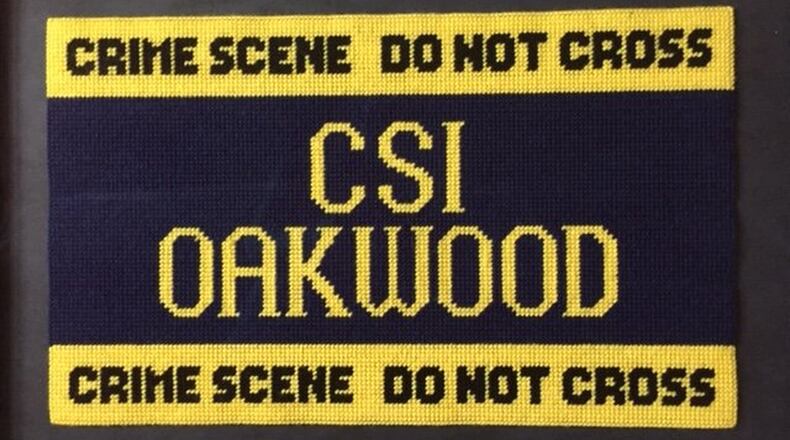MORE: Coronavirus: Oakwood students publish website to combat coronavirus
Melinda Wargacki has taught Forensic Science I at Oakwood High School for 14 years. The major topics of study include forensic entomology, fingerprinting, impression evidence, hair and fiber examination, and blood spatter analysis.
At the conclusion of Forensic Science I, students participate in a Mock Crime Scene in which they must work together in a group to process the scene and ultimately solve the crime.
“In 2017, I developed the Forensic Science II curriculum. The Forensic Science I course, often called CSI Oakwood, had become extremely popular over the years,” Wargacki told the Dayton Daily News. “I felt as though it was time to expand the class and in the Fall of 2018, Forensic Science II was offered for the first time.”
This semester in her Forensic Science II class, in addition to learning new content, students spent a lot of time studying real-life cases, many that are still actively being investigated.
The Forensic Science II class studied the case of the West Memphis three.
The students researched the case online, studied autopsy reports, listened to episodes of a podcast called “Truth & Justice,” and wrote letters to the prosecuting attorney asking him to release the evidence in this 27-year-old case so that it can be DNA tested using new technology.
MORE: Oakwood students, staff use 3D technology to make face shields
Peyton Martindale is a student in the class and said the case was fascinating to learn about.
“One really cool thing that we did with the West Memphis three case was that each student wrote a letter to the prosecuting attorney requesting that he release the evidence in the case so that it can be tested with the new DNA technology available to finally prove that Damien Echols, Jessie Misskelley, and Jason Baldwin (the three men) are innocent as well as possibly even prove who the actual killer is,” Martindale said.
Yaoyi Xing is another forensic’s student who feels that learning the science has been an eye-opening experience.
“Throughout the year, to enrich our understanding and capture the real life applications of the various fields and tools that we have learned in class, Mrs. Wargacki has incorporated many case studies into the course,” Xing said. “I believe I speak for the whole class when I say these real life cases from the past have truly opened up my eyes to the amazing practicality and power of Forensic Science.”
MORE: Oakwood Historical society seeks to preserve coronavirus stories
Another case that the class has spent a great deal of time on was the conviction of an Illinois man, Jamie Snow, for a 1991 murder.
Snow is serving a life sentence without parole at Stateville Prison in Joliet, Illinois. He is currently being represented by the Exoneration Project out of the University of Chicago.
“I have been communicating with Jamie since November of 2019 after hearing his story on the Truth & Justice Podcast,” Wargacki said. “When I told him I was covering his case in class, he offered to answer student questions through an audio recording.”
She met with her students recently on Zoom to listen to the audio interview of Snow answering questions from the class
“In my 20 years of teaching, this was probably one of the most unique and authentic learning experiences I have ever had with a group of students,” Wargacki said. “I just wish I could have experienced it in person, instead of online.”
MORE: PHOTOS: Oakwood seniors receive gowns, diplomas during drive-thru celebration
“Diving into the West Memphis 3 case was probably the most in depth case study we did all year. It connected back in so many ways to the Forensic Science I units that it was just a perfectly natural fit. It was definitely an interactive and engaging experience because we spanned over so much media, documentaries, podcasts, autopsy reports, interviews, etc.
Personal biases have no place in the justice system, especially when it comes to trying to solve murders. As fired up as these cases get me, I enjoy them because they’re what makes me so passionate about forensic science. Our justice system isn’t perfect, that’s why the vocal criticism of injustices from the public is so important
Oakwood student, Peyton Martindale, who is part of the Forensic Science II class that was involved with studying the case of the West Memphis three.
About the Author
